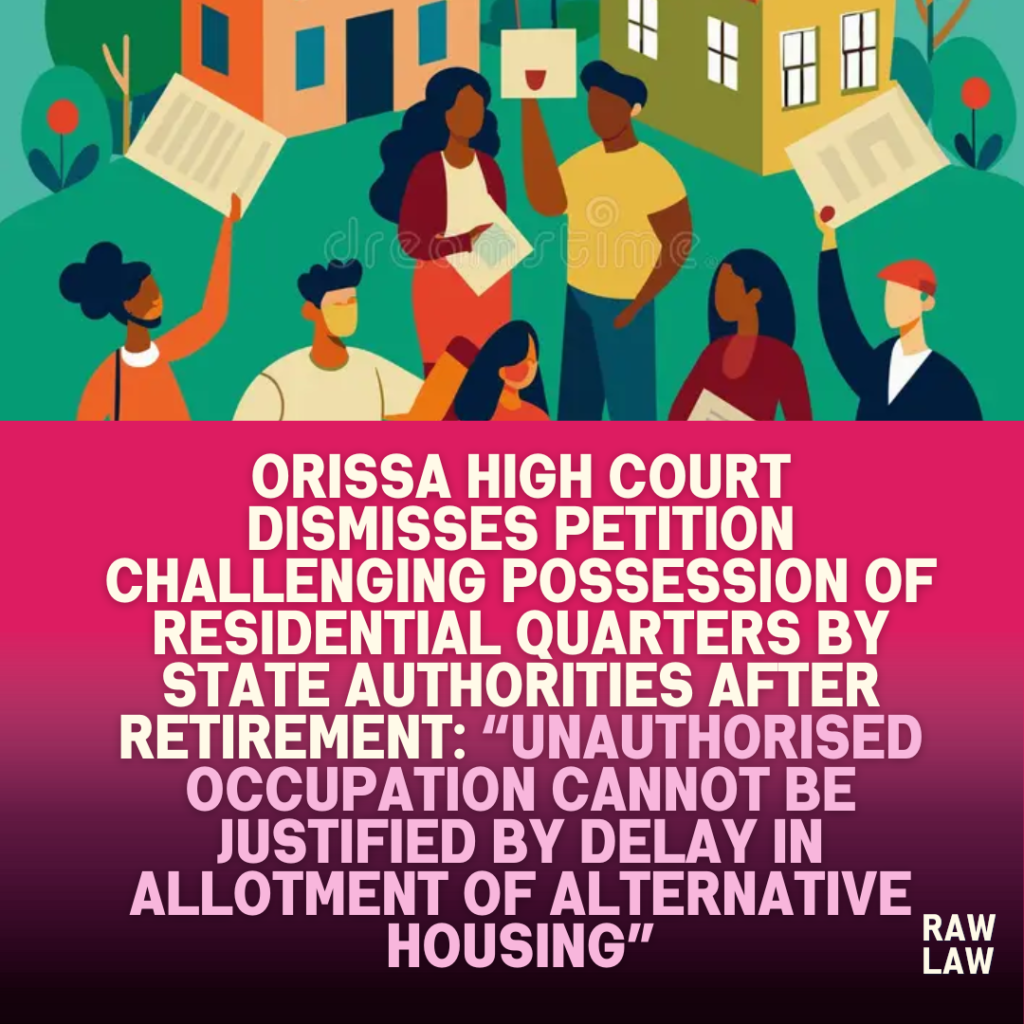Court’s Decision
The Orissa High Court dismissed a writ petition challenging an eviction notice issued under the Orissa Public Premises (Eviction of Unauthorised Occupants) Act, 1972, against retired government employees who continued occupying official quarters. The Court held that the petitioners had no legal entitlement to retain possession after retirement and the notice for eviction was valid. It observed, “A Government quarter is not a reward for past service; it is a facility for the term of active employment and must be vacated once that term ends.”
Facts
The petitioners were former government employees who had retired from their services but continued to occupy government-allotted quarters. The Estate Officer initiated proceedings under Section 4 of the Orissa Public Premises Act, treating them as unauthorised occupants after their retirement and issued notices for eviction. The petitioners challenged the notice, contending that they were not provided alternative accommodation, and that their possession was not unauthorised in view of pending representations and non-allotment of quarters under rehabilitation schemes.
Issues
- Whether the petitioners’ continued possession of government quarters after retirement was unauthorised.
- Whether the petitioners were entitled to protection against eviction due to administrative delays in allotment of alternative housing.
Petitioners’ Arguments
The petitioners argued that:
- They were entitled to continued occupation of government quarters due to the State’s failure to allot alternative accommodation under applicable housing schemes.
- The eviction notice was arbitrary and did not consider their representations for alternative housing.
- The petitioners claimed that their occupation could not be treated as unauthorised since their requests remained pending and they had not willfully violated any terms.
Respondents’ Arguments
The State authorities contended that:
- The petitioners ceased to be government employees upon retirement and their legal right to occupy government quarters also ceased.
- The continued possession of the premises without valid authority or extension amounted to unauthorised occupation under Section 4 of the Orissa Public Premises Act.
- The Act provided a complete mechanism for eviction, and the petitioners’ objections were heard and duly rejected by the Estate Officer based on the law.
Analysis of the Law
The Court analysed the Orissa Public Premises (Eviction of Unauthorised Occupants) Act, 1972, particularly Sections 3 and 4. Section 4 empowers the Estate Officer to initiate proceedings against persons in unauthorised occupation and pass orders for eviction after considering objections.
The Court noted that once the service tenure ends, there is no further statutory or contractual right to occupy the quarters. Any delay in alternative allotment does not override the statutory scheme or legal consequences of unauthorised possession.
The Court also clarified that under the scheme of the Act, the mere pendency of representation or administrative delay cannot create any enforceable right to continue possession of public premises.
Precedent Analysis
- Union of India v. N. Murugesan, (2022) 4 SCC 156
- Held that government employees must vacate quarters after retirement and unauthorized possession can attract penalties and eviction.
- Bharat Petroleum Corporation Ltd. v. Chembur Service Station, (2004) 9 SCC 139
- Reiterated that even long-standing occupation of public premises without legal authority is unauthorised and liable to be evicted.
- Ashoka Marketing Ltd. v. Punjab National Bank, (1990) 4 SCC 406
- Clarified that provisions of Public Premises Acts override general tenancy rights or equitable claims.
The High Court used these rulings to reject the petitioners’ arguments and reinforced the primacy of statutory obligations over administrative delay.
Court’s Reasoning
The Court observed that:
- There was no legal or equitable right for the petitioners to continue in the premises after retirement.
- The Estate Officer’s notices were validly issued under statutory provisions.
- Petitioners had the opportunity to raise objections before the Estate Officer and those were duly addressed.
- Continuance in government quarters after retirement, without extension or fresh allotment, is patently unauthorised.
It further remarked: “Occupation of public premises must be governed strictly by law; no sympathy or equity can dilute the statutory requirement of vacating upon cessation of service.”
Conclusion
The Orissa High Court dismissed the writ petition, upholding the eviction proceedings initiated against the petitioners. It held that no right, legal or equitable, survives in favour of retired employees to retain possession of government quarters, and delay in alternative housing allotment does not confer immunity from eviction.
Implications
- Reaffirms the legal position that government quarters must be vacated upon retirement.
- Ensures that public housing resources are not indefinitely blocked by unauthorised occupants.
- Clarifies that administrative delay does not confer any right to occupy government property.
Referred Cases and Their Application
- Union of India v. N. Murugesan: Applied to emphasise that retired employees cannot retain possession of quarters.
- Bharat Petroleum v. Chembur Service Station: Reinforced that public premises laws override possession claims without valid authority.
- Ashoka Marketing Ltd. v. PNB: Cited to support the primacy of public premises laws over general property or tenancy rights.
FAQs
1. Can a retired government employee continue occupying official quarters after retirement?
No. Once the service tenure ends, the employee loses legal entitlement to the quarters and must vacate.
2. Does delay in providing alternative housing justify continued occupation of government quarters?
No. Administrative delay does not create legal rights or justify unauthorised occupation under the Public Premises Act.
3. What remedies are available against an eviction notice under the Public Premises Act?
The occupant may file objections before the Estate Officer and, if aggrieved, seek judicial review. However, unauthorised possession cannot be justified on equitable grounds alone.



